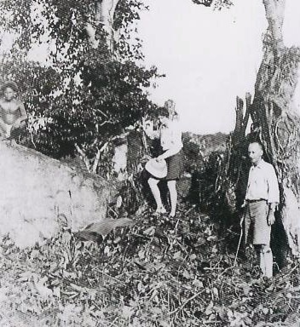Leo Austen
Contents
Notes
Office Notes
House Notes
1925.11.17 nominated
1926.06.07 elected in A63
1956.09.30 deceased A31
1957.10.03 Notice of the deaths of Mr Leo Austin [Austen] (elected 1925 subscription remitted 1947) ...
Notes From Elsewhere
b. 12 Mar. 1894 Resident Magistrate Territory of Papua
Leo Austen: the forgotten kiap
BY PHIL FITZPATRICK
LONG BEFORE Kennecott discovered the fabulous copper and gold deposit at Mount Fubilan. near the headwaters of the Ok Tedi, and six years before Charles Karius and Ivan Champion launched their famous 1926 expedition to cross New Guinea from the Fly to the Sepik, another of Hubert Murray’s dedicated “outside men”, Leo Austen, led several pioneering patrols into the area.
Always a meticulous man, Leo wrote up his patrol reports in great detail and must have wondered why Murray had overlooked him when choosing who should go on the famous first-crossing patrol. No doubt he shrugged and put it down to the typical luckless lot of the average Assistant Resident Magistrate.
Leo was born Leopold Novak Augstein in Brisbane in 1894. He was working as a clerk when World War I began and immediately enlisted. He landed with the first troops at Gallipoli and served in France where he was wounded.
He returned to Australia in 1918 as a lieutenant and, with his brothers, changed his Austrian surname to Austen to avoid the anti-German sentiment after the war.
Like many of his fellow soldiers, the war changed him and he felt out of place and became restless. He joined Murray’s Papuan Service on 3 April 1919 as a temporary Patrol Officer based at Daru in the lonely Western Division. He went on to lead many great patrols, there and elsewhere.
In 1926 a Chair of Anthropology had been set up at the University of Sydney, partly to train Cadet Patrol Officers of the then separate New Guinea Department of District Services. Hubert Murray was a great believer in on-the-job training but he allowed some of his officers, including Leo, to attend the lectures.
Leo eventually obtained qualifications as an anthropologist and began a parallel career producing many learned monographs and a book on Papua.
The 1930s was a period that saw a massive upheaval of traditional societies in Papua as the influence of the Europeans spread. Leo was one of those “enlightened” officers who sought to restore and maintain the traditional cohesion of those societies. He was particularly successful in encouraging the revival of the paramount luluais in his favourite haunts in the Trobriand Islands.
Leo became part of the Australian New Guinea Administrative Unit (ANGAU) during World War II and was one of the 15 District Officers who attended the major ANGAU conference in February 1944.
Towards the end of the war he was the presiding magistrate at the trial of a number of local people accused of collaborating with the Japanese. Leo was a sympathetic listener to these people, who explained that the Japanese had told them the Australians had been defeated and would never return.
Although he found them guilty and imposed the mandatory death penalty he fully expected, as was the practice, for the sentences to be commuted to prison terms.
The army had other ideas, however and turned up at the trials with a jeep load of rope.
The trials played on Leo’s mind and after leave in Australia he decided not to return to Papua. He was also not well and was suffering the first effects of the bowel cancer that would eventually kill him.
Through the good graces of his friendship with A P Elkin, the University of Sydney doyen of Australian anthropology, Leo obtained a position with Aboriginal Welfare in Casino New South Wales.
He gradually became appalled at the treatment of Aborigines in Australia, particularly in terms of land rights and often found himself at odds with his superiors.
With his illness getting worse and haphazard and unsympathetic treatment at Greenslopes military hospital, he decided to seek an early retirement by tapping into his Papuan superannuation. In this he was unsuccessful.
The view at the time seemed to be that old Papuan officers generally didn’t last long when they got ill, and making it difficult to obtain their super usually hastened the process and saved a lot of money.
Leo struggled on. He left Aboriginal Welfare and worked part-time for the Casino RSL. He applied for a job as a lecturer at the Australian School of Pacific Administration but was rejected. He also applied, somewhat in desperation, to go back to Papua but this was declined also.
He died in 1956, a broken man at the early age of 62 and is buried at Casino near his wife, who died some years later.
Publications
External Publications
List of published articles in A71
House Publications
Related Material Details
RAI Material
census
Other Material
RGS: Papers relating to an expedition to the Upper Fly and Tedi Rivers area
